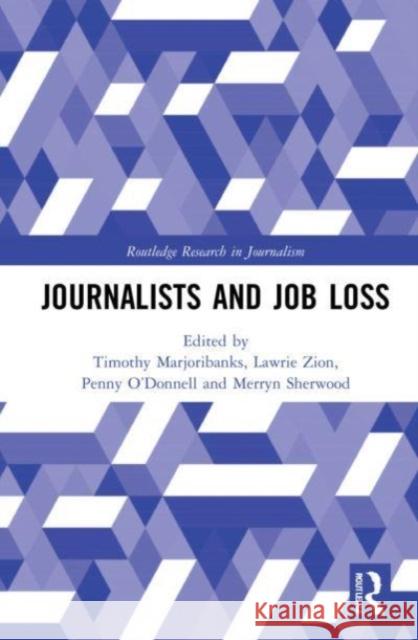Journalists and Job Loss » książka



Journalists and Job Loss
ISBN-13: 9781032129068 / Miękka / 2023 / 214 str.
Journalists and Job Loss
ISBN-13: 9781032129068 / Miękka / 2023 / 214 str.
(netto: 192,24 VAT: 5%)
Najniższa cena z 30 dni: 196,40 zł
ok. 16-18 dni roboczych.
Darmowa dostawa!
Journalists and Job Loss explores the profound disruption of journalism work in the 21st century’s networked digital media environment.
Wydanie ilustrowane
Journalism is unthinkable without journalists. But in the 2010s and early 2020s, the storytellers became the story as the digital revolution – and then the Covid pandemic – ravaged their industry. With perfect timing, this book helps us make sense of what those changes mean for democracy, communication and public life. It tells us about the personal impact of job loss and adaptation, puts the phenomenon of journalism job loss in an international perspective, and points the way to a better understanding of journalism in the present and the future.
Professor Sally Young, University of Melbourne, Australia
This vital book on the experience of job loss and its aftermath in journalism is among the first to explore comprehensively a phenomenon understudied by journalism scholars and feared by news workers whose livelihoods depend on news organisations’ paycheques. As the pandemic further diminishes employment and increases precarity in journalism, the insights this edited collection provides into these often-traumatic transformations and the subsequent struggles for new careers and professional re-orientation become even more urgent. Especially compelling are those chapters that show how job loss experiences of (ex)journalists intersect with or are shaped by gender, class, race, geographic location, news industry sustainability or options for collective organization.
Mirjam Gollmitzer, Université de Montréal, Canada
Journalism is undergoing massive transformations around the world, including unprecedented job losses and growing precarity. Yet, we know little about the experiences of those who have been forced to leave the industry after often long and successful careers. Journalists and Job Loss fills this important gap, giving us a detailed and comparative account of what losing their job has meant to these journalists. It is truly a landmark study that should be required reading for anyone trying to better understand current developments in journalism globally.
Folker Hanusch, University of Vienna, Austria
Traditionally the term ‘precarity’ refers to a state of persistent insecurity in respect of employment and income. Today the term also often registers the precariousness of life in our world of accelerating and mutually compounding ecological and economic crises. Journalists and Job Loss with its multi-faceted and in-depth focus on the structural and professional transformations of journalism in an era of digital and industrial change, serves to remind us of the consequences of increased journalist precarity on journalism and the reporting of our increasingly precarious world. Timely, necessary, insightful.
Simon Cottle, Professor of Media and Communication, Cardiff University, UK
List of Contributors; Acknowledgements; Introduction: Understanding Job Loss Among Journalists; 1. Understanding Job Loss Among Journalists; Part I. A New Field of Study: What Happens Next After Job Loss in Journalism; 2. Australian Journalists: Adapting to Redundancy Over Time; 3. Passion and Precarity: Producing Public Interest Journalism After Job Loss; 4. Newly Branded: The Experiences of Post-Redundancy Journalists Who Go on to Work in Public Relations; 5. Understanding Loss in Legacy Newsrooms; 6. Job Loss and Unionism in Australian Journalism; Part II. Towards World-Wide Understanding: Case Studies of the Aftermath of Job Loss in the Global North and South; 7. Living on the Edge: U.S. Newspaper Journalism Following the Great Exodus; 8. Finland: Shock and Relief; 9. The Netherlands: Making it Work; 10. Not ‘Just Another Job’: Journalism as Public Service; 11. Indonesian Women Journalists and Precarious Work; 12. Traumatic Transitions and Loss: How Journalists in South Africa Experience Job Loss; 13. Plan B: The Abandonment of Journalism in Portugal; Part III. Beyond Newsrooms: Job Loss, Media Sustainability, and Work Futures; 14. Down, But Not Out: Journalism Jobs and Media Sustainability in the UK; 15. The Job is Only Part of the Story: Understanding Job Loss in Journalism Through Livelihood; 16. Freelance Journalists in Australia at a Time of Industry Contraction and COVID-19
Timothy Marjoribanks is Professor of Management at Swinburne University of Technology, Australia
Lawrie Zion is Professor of Journalism at La Trobe University, Australia
Penny O’Donnell is Senior Lecturer in International Media and Journalism at The University of Sydney, Australia
Merryn Sherwood is Senior Lecturer in Journalism at La Trobe University, Australia
1997-2025 DolnySlask.com Agencja Internetowa
KrainaKsiazek.PL - Księgarnia Internetowa









